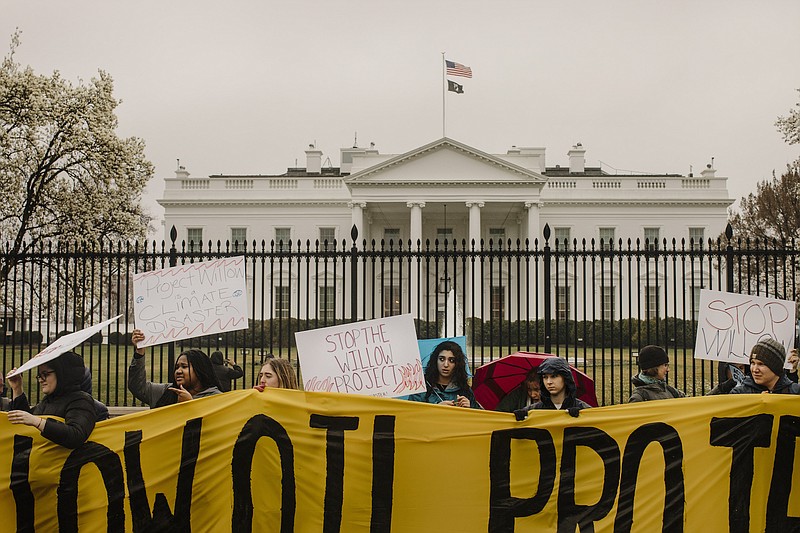I am old enough to remember the late President George H.W. Bush's promise at the Republican National Convention in 1988 of "Read my lips: no new taxes," a pledge that he reneged on later in his tenure when he raised taxes in 1990.
And how could I ever forget the 1989 Exxon Valdez oil spill in Alaska, where 11 million gallons of oil fouled one of the most pristine and sensitive environments on the planet? Thirteen hundred miles of coastline were trashed -- killing, according to the National Oceanic and Atmospheric Administration:
› An estimated 250,000 seabirds.
› 2,800 sea otters.
› 300 harbor seals.
› 250 bald eagles.
› As many as 22 killer whales.
› Billions of salmon and herring eggs.
Today, I recall a promise made during the 2020 presidential campaign by Joe Biden that there would be "No more drilling on federal lands, period. Period, period, period."
Alas, President Biden has caved to the powerful oil and gas lobbyists by allowing the controversial $8 billion ConocoPhillips Willow oil project to proceed on Alaska's North Slope.
Over the next three decades, some 600 million gallons of crude oil will be drilled out of 200 oil wells in yet another vulnerable ecosystem.
The environmental footprint ConocoPhillips will place in the fragile tundra is immense. In addition to the oil wells, there will be new roads built, as well as pipelines, an airport and a gravel pit. Not to mention the disruption to the many species of birds and animals in the region.
What about the carbon footprint that the project will create? According to the government's own Bureau of Land Management, digging up those 600 barrels of crude oil -- 180,000 barrels a day -- out of the Earth over 30 years will result in releasing into our already overheated atmosphere greenhouse gas emissions that will be equal to emissions from 1.7 million cars.
So much for Biden being the environmental leader that he promised to be during the campaign.
Former Vice President Al Gore said it was "recklessly irresponsible," and the Center for American Progress, a major Biden-aligned think tank, called it a "carbon disaster" that "threatens to negate all of that promised progress on renewables."
Alaskan lawmakers were thrilled with the announcement, and the 2,500 jobs it will create.
The North Slope Alaskan town of Nuiqsut and its population of Indigenous people will be the community most affected by the Willow project. In a March 4 letter to Interior Secretary Debra Haaland, the town's leaders said the consultation process between the government and its citizens was inadequate.
Haaland, a Native American herself, offered this rather odd road map of Biden's environmental record. "I am confident that we are on the right path, even if it's not always a straight line."
The "right path" in the first 25 months of Biden's term translates, according to The Guardian, into 6,787 drilling leases granted compared with former President Donald Trump's 6,695 leases during his first two years in office.
Even the announcement that Biden was setting aside some 16 million acres in Alaska to prevent or limit drilling for oil in Alaska and the Arctic Ocean did little to disguise the broken Biden campaign promise. And all those beautiful, endangered critters up north? Well, rest assured, the administration stated, they "will be protected in perpetuity from extractive development.
But the Earth is not a Balkanized ecosystem. Walls do not exist around our shared atmosphere or in our common oceans. Ripple effects of nuclear plant meltdowns, oil spills, wars and other pollutants affect all of us, although those events affect the poor and Indigenous disproportionately.
In the administration's rush to appease the powerful oil industry, it has once again demonstrated that no matter which party is in power, it must kowtow to corporate interests who green-wash their way to record profits at the expense of our planet's health.
Stephen J. Lyons is the author of five books of essays, including "Going Driftless" and "West of East."
The Chicago Tribune
